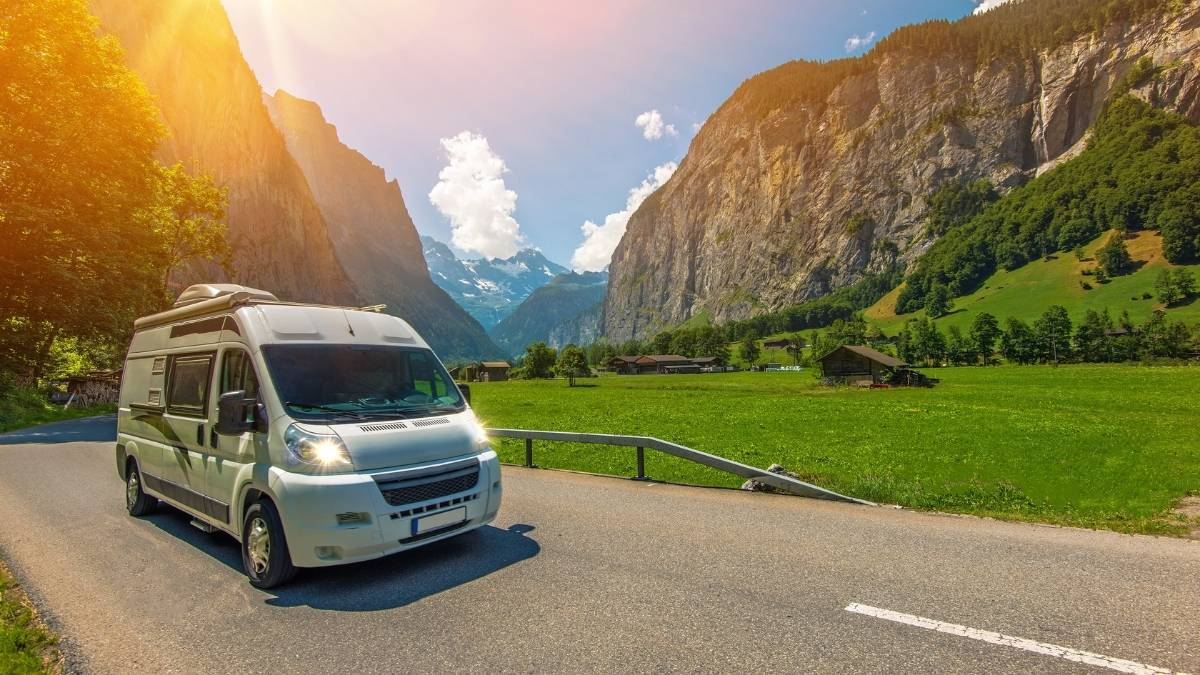A campervan is a significant financial investment. To rent out your campervan when you aren’t using it is a way of recouping some of the costs. But is it a good idea?
An oft-quoted statistic says that on average campervan and motorhome owners only use their leisure vehicles four times a year.
How accurate this figure is, is anyone’s guess. I know in our case, we use our campervan as our daily ride so it doesn’t sit there idle on the drive when not on overnight trips away.
Until recently I hadn’t thought about renting out our campervan when we aren’t using it and benefitting from a useful additional income stream. It’s a topic which has been coming up more and more lately, most likely due to the increase in staycationing over going on holiday overseas.
We have a second car, so are we missing a trick here? Should we be thinking about arranging to rent out our campervan and recouping some of the costs it brings?
What are the benefits? What are the pitfalls?
Read on to find out whether renting out your motorhome or campervan is for you.
- How do I rent out my motorhome or campervan?
- Campervan and motorhome peer-to-peer rental platforms
- How much money could I make renting out my campervan or motorhome?
- Campervan and motorhome hire insurance – the options
- Self Drive Hire insurance
- Campervan and Motorhome Day Insurance
- Security Deposit
- Breakdown cover
- What should you supply with your campervan?
- Campervan hire demand
- To hire or not to hire? Are we going to do it?
How do I rent out my motorhome or campervan?
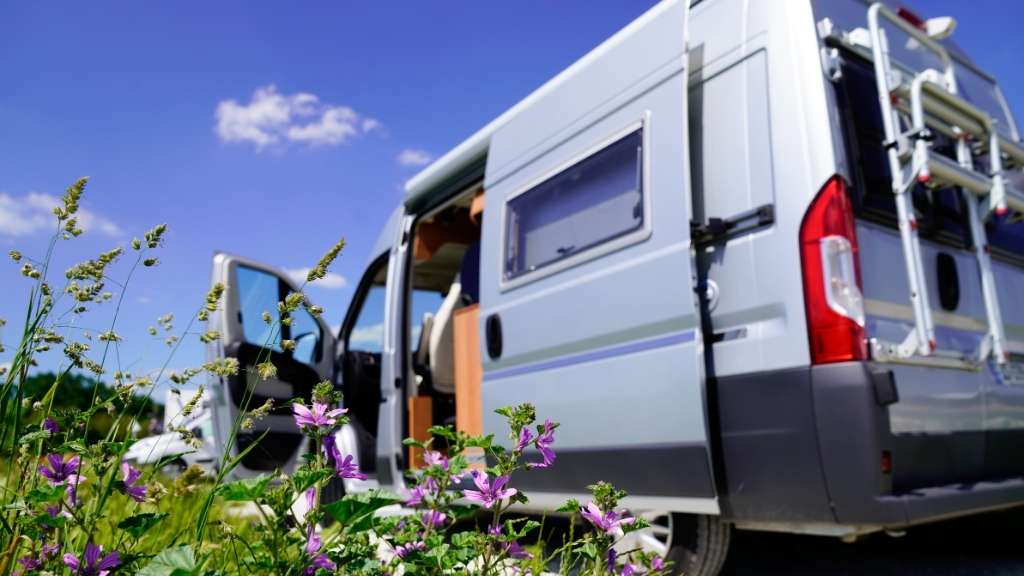
There are a couple of ways to do this.
DIY approach
Put on your marketing hat and promote your van yourself. For example:
- Take some pictures and share them on your social media profiles, letting people you know that your campervan or motorhome is for hire.
- Create a website around the hire. It’s quite a lot of work and expense though. How will you get eyes on it?
- Pay for advertising in a local publication or website.
The self-managed approach to rent out your campervan is labour intensive but could be relatively cheap.
Peer-to-peer rental platform
An easier approach to rent out your campervan is to use a specialist peer-to-peer website.
The new breed of peer-to-peer sharing platforms such as example Airbnb and FatLlama allow owners to share their assets for a rental fee. Both these sites have spotted a huge gap in the market for owners and hirers to find each other.
Not a surprise then that this private asset renting concept has come to the world of leisure vehicles. Yes, there are now a number of rental platform for campervans, caravans and motorhomes serving the UK.
Campervan and motorhome peer-to-peer rental platforms
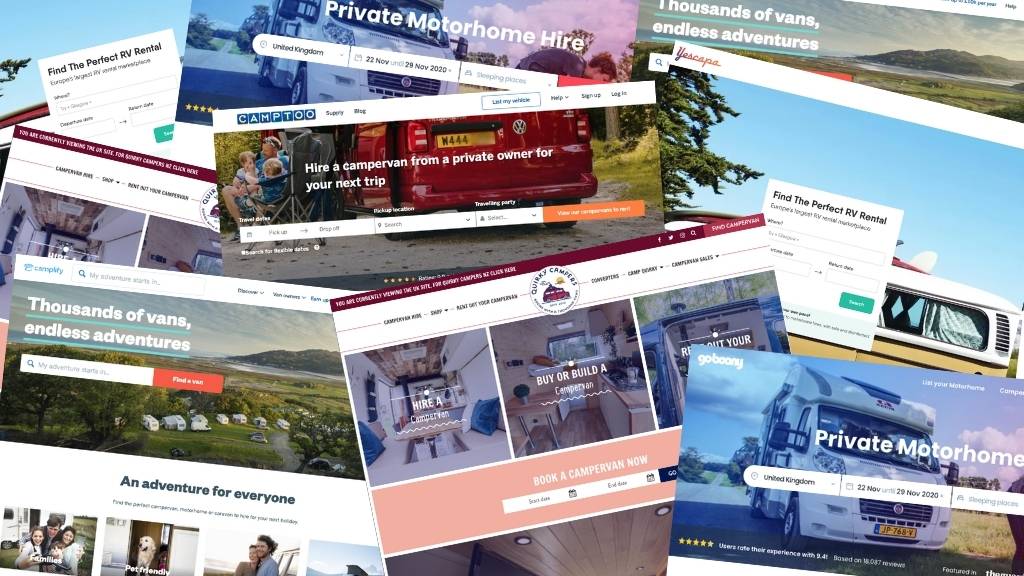
There are a few strong players in the private campervan hire space right now so we’ve checked out each one to discover what money we could potentially make and how much risk we carry as campervan owners.
The case for using one of these platforms is strong. They are well established, have a presence in several countries and have large audiences to market your vehicle to.
The process is quick and easy allowing the campervan or motorhome owner to list their van and any additional hire equipment either for a nominal fee or a revenue share. Each platform treats this process slightly differently.
It’s a comfort too to have someone act as a mediator between vehicle owner and the hirer and they will usually take care of the payment process and hold the security deposit.
Here are the most established and trusted providers on the market right now. This table demonstrates what you can expect to pay for and earn using these services:
Private campervan rental websites
| Platform | Costs to Vehicle Owner |
|---|---|
| Yescapa | Service fee: 15% of hire charge. Yescapa adds 15% to the price you set for your vehicle so you come away with what you feel your van is worth per night. The additional 15% is taken as a service fee. |
| Camplify | Service fee: 8% (+VAT) of hire charge. This is a straight revenue share. You get 92% (less VAT) of the booking revenue. |
| Camptoo | Service fee: 15% of hire charge. Camptoo adds 15% to the price you set for your vehicle so you come away with what you feel your van is worth per night. The additional 15% is taken as a service fee. |
| Goboony | Service fee: 15% of hire charge. Goboony adds 15% to the price you set for your vehicle so you come away with what you feel your van is worth per night. The additional 15% is taken as a service fee. |
| Quirky Campers | Service fee: 18% (+VAT) of hire charge. This is a straight revenue share. You get 82% (less VAT) of the booking revenue. |
Other websites
There are a few other campervan and motorhome private hire websites available for UK audiences, but we have included only sites we would consider using ourselves.
During our research, we discovered some sites that obscure their service fees or do not supply clear contact details. These have not been included.
Private hire platform fees
Publishing, marketing, customer service, and insurance does not come for free. It is a fair deal, therefore, that these private hire platforms add on service fees or take a percentage of the per-night rental fee to cover their running costs.
The benefits of using one of these services outweighs the costs in our opinion.
Listing your van
As a campervan owner, each platform will require you to provide a range of documentation to be allowed to list. This can include:
- V5 Certificate to prove ownership of the campervan or motorhome.
- Proof of insurance – even if you are using day insurance through the website.
- Latest MOT certificate.
- Insurance and MOT expiry dates – the platform keeps these stored and makes sure you keep the info updated.
- Personal identification documents.
- Bank details for receipt of payment of hire revenue.
It would also be prudent to have a gas and electricity safety inspection and a habitation check.
You’ll also need some cracking photos to showcase all the selling points of why someone would want to hire your campervan or motorhome.
The various hire platforms all have a similar process for vetting hirers. For the recommended platforms, all checks are made in advance of the hire and the hirers have provided all the necessary documentation to adhere to the insurance specifications.
How much money could I make renting out my campervan or motorhome?

There is no clear answer to how much money you can earn because it depends on a range of factors:
- The age of the vehicle.
- The spec of the vehicle.
- How many seatbelted positions it has.
- How many sleeping berths it has.
- Time of year, you can ask for more during peak seasons.
- Where it is located – are you based near to airports/train stations, major road networks?
- How many weeks per year you can rent it out.
| For example, a VW conversion campervan, 5 years old, four-berths. A typical listing suggests a range of £95 to £120 per night. Multiply that by 7 for a one-week hire = £665 to £840 per week. |
Nice. Just a one week hire would cover a lot of annual costs. That said, we’ve yet to cover what could be the biggest stumbling block – insurance. Just what risks am I taking to hire out my campervan?
Campervan and motorhome hire insurance – the options
If you rent out your vehicle commercially (as in you receive money in exchange for loaning the vehicle) it is a legal requirement that you have adequate insurance to cover both parties in the event of injury or damage.
Most domestic insurance policies do not cover commercial rentals or even non-commercial loans to a third party. To be properly covered you’ll need one of two types of insurance:
Either
- A specific annual policy which allows for commercial hirers called “Self Drive Hire” insurance, or
- Short term motorhome insurance which is known as “Day Insurance”, which is a pay per trip, per day insurance policy.
Self Drive Hire insurance
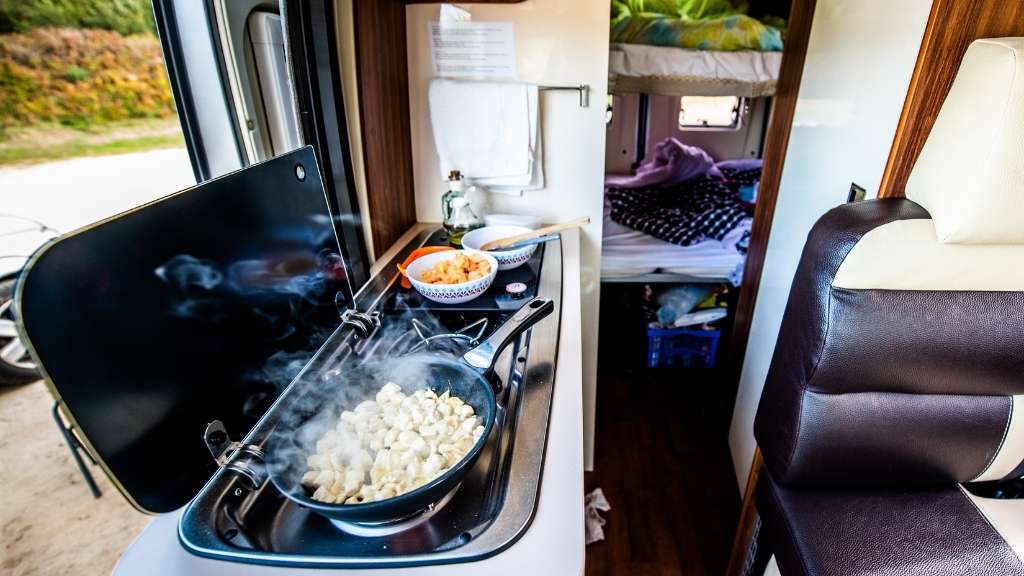
This annual policy will cost you considerably more than your standard motorhome or campervan insurance policy but does allow for unlimited commercial hires over the year.
If, as the van owner, you have an annual Self Drive Hire policy, you could easily build in an additional few pounds per night into your nightly hire rate to absorb some of the extra cost you have incurred.
Self Drive Hire policies are not very common but there are a small number of specialist brokers who deal with it. Two firms we have spoken with are Alan Boswell Independent Insurance Brokers and Gallagher.
Some brokers will require you to have 12 months hiring experience before they will offer you an annual policy, so you may have to go the Day Insurance route for the first year before you can pursue this option.
If you plan to hire your vehicle out for many weeks of a year, having a Self Drive Hire policy to insure your campervan or motorhome, may work out to be the most cost-effective way to get covered.
What is the average cost of self drive hire insurance?
This wholly depends on the value of your vehicle. Alan Boswell advise for example:
| Value of Vehicle | Annual Cost | Excess |
|---|---|---|
| Up to £35,000 | £1,400 | £500 |
| £35,000 – £45,000 | £1,650 | £750 |
| £45,000+ | £1,900 | £1,250 |
Self drive hire insurance – policy wording
Typical terms you can find in your Self Drive Hire policy can include:
- Fully comprehensive cover.
- Includes drivers aged 25-79.
- No Hidden Costs – Unlimited hires, Unlimited mileage.
- Cover included for theft by hirer and cooking and heating risks (subject to 25% owner co-insurance).
- Free comprehensive cover for own use of vehicles.
- EU cover included.
Policy requirements include:
- Category S5 Tracker may be required for vehicles over £50,000 in value.
- £1000 excess (although this rises according to the value of the vehicle).
Exclusions – read the small print!
The above example has several exclusions which may be a cause for concern:
- A 25% co-insurance clause for theft or damage resulting in the use of the cooker. In other words, you will not be covered for a quarter of the loss if the hirer’s Full English fry-up gets out of control and destroys your van.
- You are liable for 100% of the theft if the keys have been left in the ignition.
- If a hirer pays you in cash for the hire, this invalidates the insurance. You must have a traceable payment by card or electronic transfer.
As the van owner, the liability for any damage or theft falls entirely on you.
Campervan and Motorhome Day Insurance
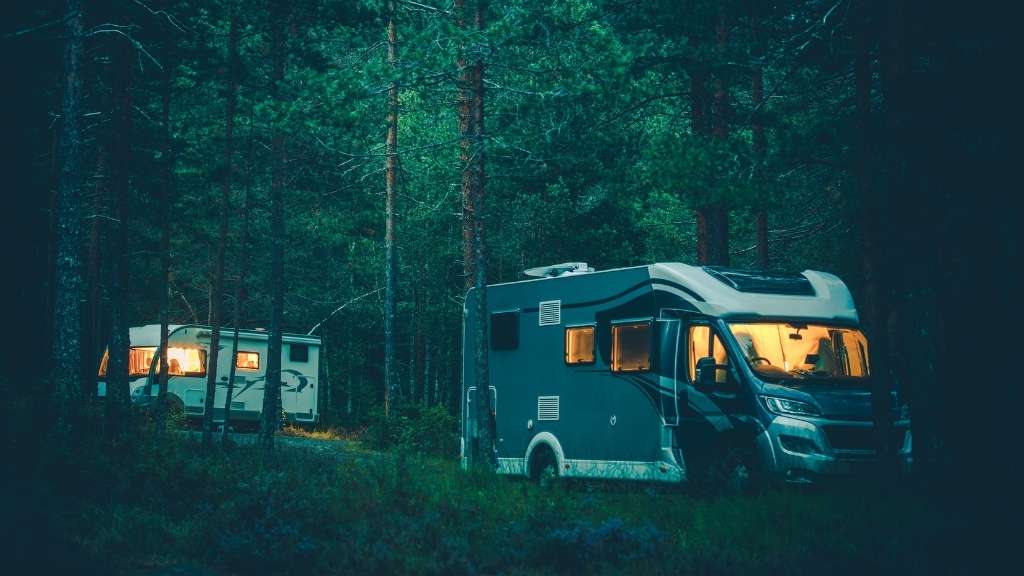
Day Insurance is the type of insurance you’ll most commonly see used on the private campervan rental websites.
It is insurance which covers the hirer per day for the length of a trip.
People use Day Insurance for all kinds of reasons, including teaching someone to drive in their car, borrowing a van to move something big, or loaning a vehicle to friends or family visiting from overseas.
You purchase extra cover through Day Insurance to insure your vehicle for each specified day you are allowing someone else to drive it.
How to take out Day Insurance
Unlike Self Drive Hire insurance, Day Insurance can be purchased directly by anyone.
For ease, many of the campervan rental websites have negotiated a Day Insurance arrangement directly with Allianz (the only insurer that seems to deal directly with the platforms) or they guide you to providers such as Dayinsure, Tempcover, or Sky Insurance.
One benefit of buying through a platform is they have more control over the claims process if they have a bespoke arrangement with a day insurer. Less hassle for you should a claim arise.
Day Insurance driver conditions
Like with any insurance, there are criteria a hirer must adhere to, to qualify.
These requirements are typically:
- The driver must be between 25-69 years old
- Have at least 2 years of driving experience
- No more than 6 points on their license
A booking using Day Insurance can need a 5-day booking window to ensure all the necessary documents are in place before the hire. A Self Drive Hire policy has a little more flexibility.
If a hirer does not meet these requirements, cover may still be offered but the per price per day would increase.
What does Day Insurance cost for campervan hire?
| Platform | Guide cost | Who pays? |
|---|---|---|
| Yescapa | £24/day | The hirer |
| Camptoo | £21.28 | Vehicle owner |
| Camplify | £7/£11/£17/day + 12% IPT (depends on vehicle value) | Vehicle owner |
| Goboony | £20 | The hirer |
Security Deposit
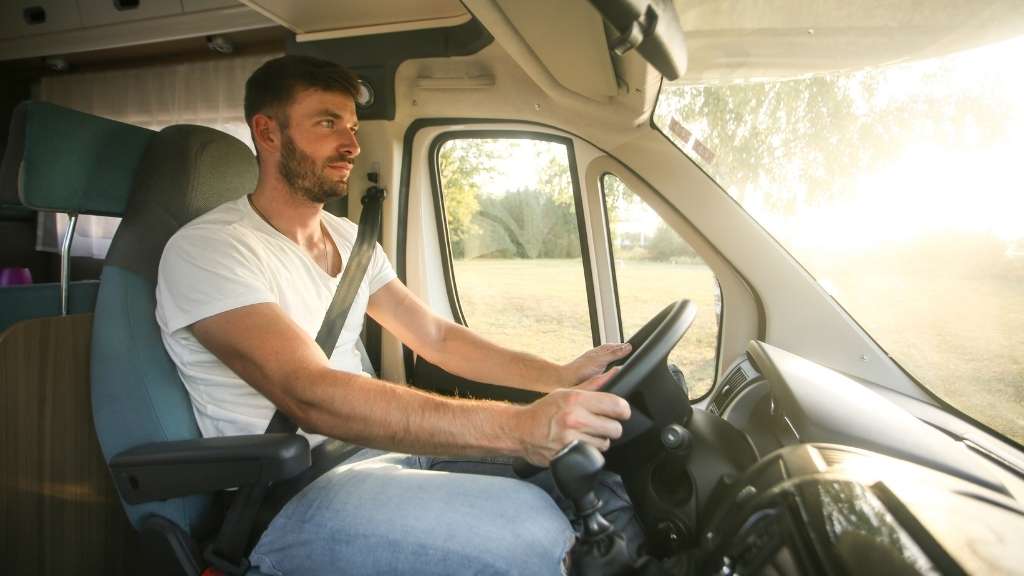
Typically the security deposit is set at £1,000 and the campervan rental platform will take an imprint of this amount on the hirer’s credit card and the start of the hire.
£1,000 is a hefty liability to carry so the hirer can also take out an excess reduction policy to bring this liability down to £500.
Match deposit to excess
It is advisable for the vehicle owner to set the security deposit to the excess amount stated by the insurer to ensure they are not personally out of pocket in the event of an accident.
The majority of the hire platforms look after the security deposit and give the campervan or motorhome owner the opportunity to block the return of the money to the hirer in the event of discovering damage.
Dispute resolution
If you do decide to list your campervan for hire with one of these platforms, make sure you ask the question to understand what role they will play in resolving disputes and what your claim window will be.
Who pays the hire insurance?
Who pays the insurance is an interesting topic. There is some argument that if the hirer pays for the insurance then they take more care of the vehicle.
On the other hand, if the hirer pays it could mean you have to charge less per night for your vehicle to make the cost to the hirer viable. Perhaps it doesn’t matter who pays as it all evens itself out in the end.
As well as insurance, there are other considerations to take into account when you decide whether to rent out your campervan such as what you include in the van hire price.
Breakdown cover
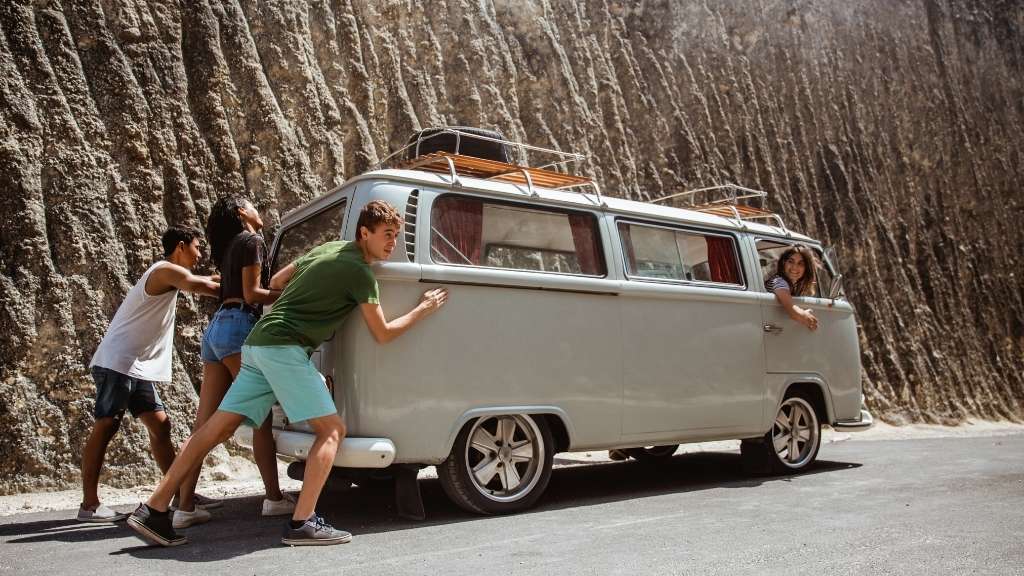
Hiring out your van comes with responsibilities to your hirer. You do need to have breakdown cover with the RAC or similar to protect your vehicle and the campervan renters.
Imagine your van conks out in the middle of nowhere, far from your address, you are going to need to think about how to get it home again and back on the road.
What about the people who have hired your vehicle? With their transport and accommodation out of commission, they are truly stuck.
Breakdown cover features
Breakdown cover will allow for a broken-down vehicle to be towed to a garage of your choice or the nearest one to where the breakdown has occurred.
It will outline exactly how they will assist if a breakdown happens for example how they look after the renters. This may involve a per night amount paid out to look after the renters of the vehicle to ensure they can arrive at another destination and or accommodation paid for for a few nights until matters are resolved.
The majority of the platforms will include breakdown cover with any Day Insurance they sell you. Be sure to ask what the process is in the event of a breakdown.
Often, only one tow is included, so think carefully about where you would like the vehicle to be taken to. Some policies may charge one or other party for the cost of the tow depending on why the breakdown has occurred.
This could be as much as £200 paid for either by the campervan owner if it is deemed the vehicle hasn’t been properly maintained or by the hirer if it is deemed the breakdown has happened through misuse.
It may be worth supplying your own breakdown cover if it offers more protection overall than the one supplied by the rental platform. Definitely worth checking what is and isn’t included and if any extra costs are likely in the event of a breakdown.
What should you supply with your campervan?
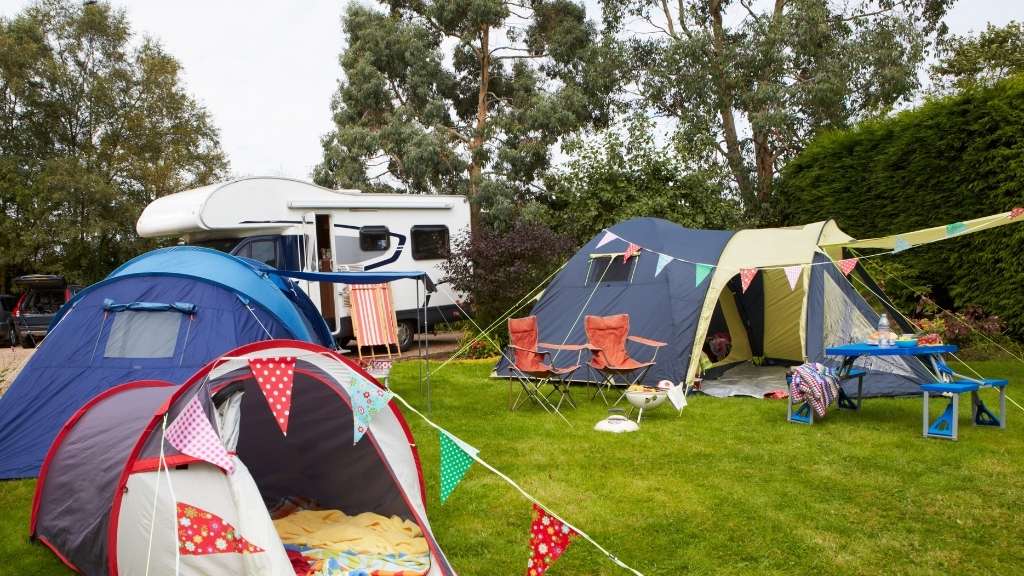
Most campervan and motorhome owners have a large collection of additional equipment they use alongside their vehicle.
It is entirely up to you whether you would want to loan these items out to hirers. The positives are that you can charge extra for additional equipment and they may enjoy your van better with all the right kit.
These can be charged for on a per night or a whole trip basis per item.
Chargeable equipment examples
- Drive away awning/tent/annex
- Bike rack
- Bikes
- Scooters
- Projector or other tech
- Table and chairs
- Bedding/Towels
- Inflatable beds/furniture
Other services
Other services you may wish to charge extra for are:
- Collection/Delivery to train station or airport
- Per hour charge on top of agreed rental
- Mileage over an agreed amount
Non-chargeable equipment
Most hirers would expect kitchen equipment such as pots, pans, plates, utensils and cutlery and a full gas bottle to be included with the campervan or motorhome hire.
For a belts-and-braces approach, a first aid kit, fire extinguisher, and a carbon monoxide alarm should also be supplied.
European vehicle requirements
If you are allowing your vehicle to be driven to mainland Europe, it is a legal requirement that the vehicle should contain items such as a fluorescent jacket, a warning triangle and 2 breathalyser kits.
Consumables
Some van owners like to go the extra mile and leave the hirers a small number of consumables like tea, coffee, sugar, milk and a few cleaning supplies.
Parking
Hirers will probably arrive at the rental location in their own vehicle so it would be desirable for them to leave their vehicle parked at the collection point.
If this is not something you can offer, it is definitely worth pointing this out up-front so they can make other arrangements.
Campervan hire demand
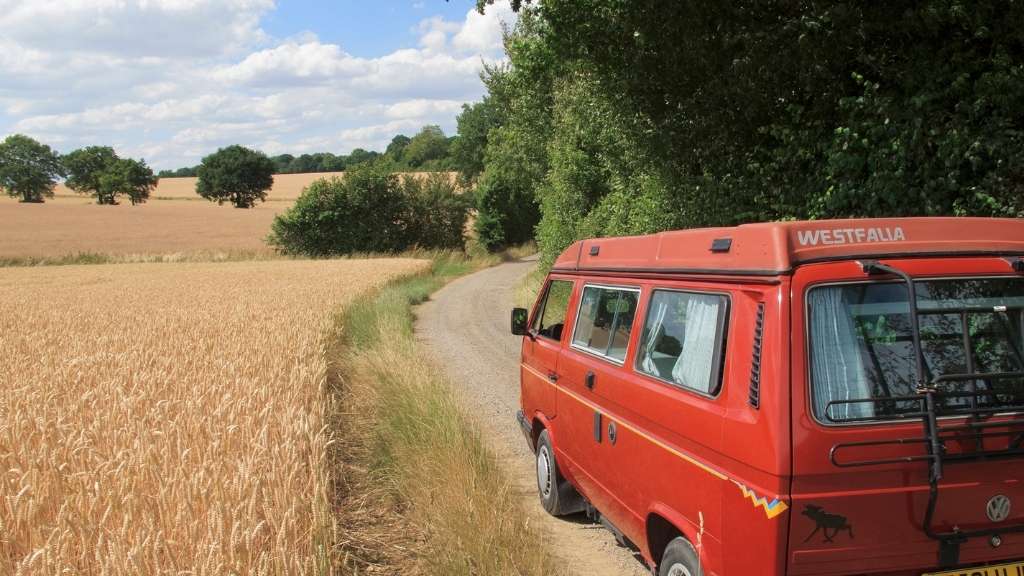
Right now in 2020, campervan and motorhome hire has never been more in demand. One platform informed me their business has increased 250-300% on the same period from the previous year.
Another platform told me they don’t have enough vehicles to meet the current demand, and it’s well past high summer.
Campervans and motorhomes have already been booked for next summer in readiness for the expected summer uplift.
Thanks to the Covid-19 crisis, staycations have become the top choice for holidaymakers with thousands cancelling their overseas trips in favour of staying closer to home.
Camping, campervanning, or caravanning is a more affordable holiday than a self-catering property or a hotel, adding to its popularity. This is true particularly in times of recession making it an appealing option to those who just want to get away for a few nights.
If you have read this article and would like to explore the idea further, the common message from all the platforms is there is high demand and not enough campervan supply so if you are looking to make money from your campervan or motorhome, there has never been a better time.
To hire or not to hire? Are we going to do it?
We’ve done all the research into Self Drive Hire insurance policies, what the platforms cost to market our vehicle, and what our earnings could be and our decision is – drumroll please – no, we are not going to rent out our campervan.
Our VW California Ocean falls into the top pricing bracket for insurance so it will be an expensive endeavour for us to get the necessary cover.
The idea of a potential £750 week in hire revenue is definitely appealing. But when assessing the risk and hassle of accidental damage or theft, how upset and inconvenienced we would be, and how much the insurance would cost, the answer for us at this time with the campervan we own is a definite no. It simply doesn’t add up for us.
Perhaps if we owned a less valuable campervan or motorhome and we didn’t have such an emotional attachment to it, this could be a good side business to earn a secondary income.
If that is your situation then go for it. There has never been more demand and there is money out there to be made.
